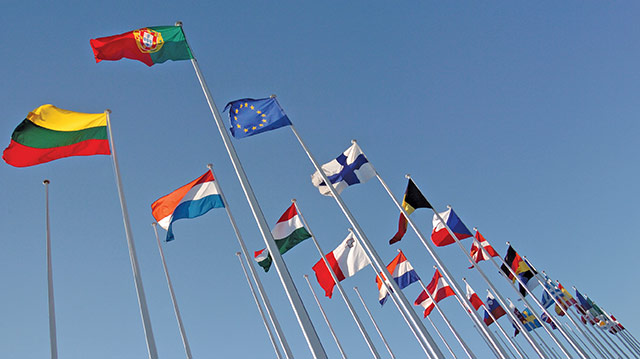The impact of Brexit on the Island economy
 If economics was a hard science and if the case made by the Remains against the Leaves in the Brexit referendum had concerned only narrow economic and business issues, then the logic in favour of the UK and its regions remaining in the EU would have been inescapable, writes John Bradley.
If economics was a hard science and if the case made by the Remains against the Leaves in the Brexit referendum had concerned only narrow economic and business issues, then the logic in favour of the UK and its regions remaining in the EU would have been inescapable, writes John Bradley.
The surprising element of the UK debate and the narrow margin in favour of Leave was that the mainly economic and business arguments failed to persuade enough people that their best interests would be served by remaining inside the EU. Attempts by the Remain side to portray leavers as economic “know nothings” in thrall to demagogic politicians were not effective. Half truths and even outright lies were regularly asserted by the Leave side, but nobody seemed to care. Expertise was at a discount. There were deeper issues in play that were not captured by the economic and business arguments.
 What can we conclude from the fact that a majority in Scotland (62 per cent) and Northern Ireland (56 per cent) voted to Remain, but in Wales and England there was only a minority (48 per cent and 47 per cent, respectively). First, this result was not mainly driven by business or economic factors. The arguments in favour of remaining part of a big, open market were equally compelling for all four UK regions. Openness to international trade is a global rather than just an EU phenomenon. Even the Leaves wanted to retain access to the Single European market, but on UK terms. Second, the way in which ordinary people (i.e. not just the political and business elites) react to how globalisation affects them really matters.
What can we conclude from the fact that a majority in Scotland (62 per cent) and Northern Ireland (56 per cent) voted to Remain, but in Wales and England there was only a minority (48 per cent and 47 per cent, respectively). First, this result was not mainly driven by business or economic factors. The arguments in favour of remaining part of a big, open market were equally compelling for all four UK regions. Openness to international trade is a global rather than just an EU phenomenon. Even the Leaves wanted to retain access to the Single European market, but on UK terms. Second, the way in which ordinary people (i.e. not just the political and business elites) react to how globalisation affects them really matters.
The present danger is that eminently reasonable and sane policies that are serving to integrate the Single Market will be threatened by the decision of an electorate that has come to fear the wider social consequences of globalisation. In earlier eras developed economies tended to be the winners in the globalisation game. Today, aspects of even the most developed economies, including the UK, can be hollowed out by globalisation where multinational business strategies become detached from the concerns of ordinary people. For example, the claim that immigration is almost always beneficial to the receiving state is all very well in the abstract, but played badly with poorly skilled people in depressed regions of the UK where they are the people who are likely to remain unemployed. But surely this is a result of the failure of UK rather than EU regional policy. The EU is part of the solution, not the problem.
To people on this island, the Brexit debate and its outcome have deep historical resonances. In Britain, our nearest neighbour and the most important trading partner for North and South alike, a majority of the voting public yearned to be free of entanglements and coercion from what they perceived as an embryonic and domineering European super-state. Why should we be surprised? Turn the clock back to 1916 and imagine a situation where there were economists and business leaders as well as patriotic zealots around the tables in the smoke-filled rooms in which the events of 1916 were planned. Do you think for one moment that the zealots would have had any time for arguments claiming that Irish economic welfare at that time was possibly better served by remaining as an integral part of a hegemonic UK and British Empire single market? Many in the Irish independence leadership were blind to economic and business realities and indifferent as to how they might be addressed by an independent state.
As Ireland split from its dominant trading partner in 1922 (a time when 95 per cent of exports went to the UK), it inaugurated 50 years of political, economic, business and social turmoil, experimentation and uncertainty that did not draw to a close until Ireland, together with the UK, joined the then EEC in 1973. It was another 25 years before the Belfast Agreement in 1998 instituted an era of relative normality within Northern Ireland and between North and South. In combination with EU membership and assistance, the Irish border gradually faded into the background, leaving only the enduring human challenge of building greater trust and co-operation between both regions.
The tragedy of Brexit is that is has an unintended consequence. It risks unravelling a slow and painful process that held out prospects of building prosperity on this island in a way that was acceptable to all community and political interests. The fact that the Irish Foreign Minister has had supportive words from all of his EU ministerial colleagues that the special UK-Irish relationship, and the UK-Irish land border in particular, will be taken into account in the Brexit negotiations is not very reassuring, since one would hardly expect them to say otherwise at this early stage. The absence of any official preparation on the Leave side within the UK government for the kind of post-Brexit world that they would inhabit is eerily similar to the situation in which the Irish Free State found itself when policy makers faced into the challenges of running their new state.
Understandably, the short-term consequences of the Leave result has been turmoil in the markets. Markets love turmoil and make lots of money from it, but things will settle down as the various actors, public and private, reassess the new scenarios and watch how the EU-27 take on board the fact that their second largest member state has decided democratically to leave for reasons that have also, in effect, brought much business in the rest of the EU to a political standstill (Greece; migration; fiscal integration; banking regulation; a perceived lack of democratic accountability; the rise of euro-sceptic right-wing political parties, etc.).
If the EU-27 were a homogeneous bloc of like-minded states, Ireland would indeed face great difficulties in striving to ensure that the UK-Ireland special relationship was taken into account in the UK Leave negotiations. If we kicked up too much fuss, the EU-26 might even feel that we should consider going as well! But the Leave vote is very likely to force into the open a host of previously suppressed tensions that have been bubbling below the surface within the EU. In such a situation, the Irish case is likely to be easier to articulate and promote and a more benign UK Leave scenario perhaps less difficult to secure. But the fact that the two main parties in Stormont are on opposite sides of Brexit does not bode well for prospects of flexibility, good will and understanding as our island comes to terms with a British decision that was not in our best interests.
Dr John Bradley was formerly a Research Professor at the ESRI and is an Honorary Professor at the QUB Business School.





